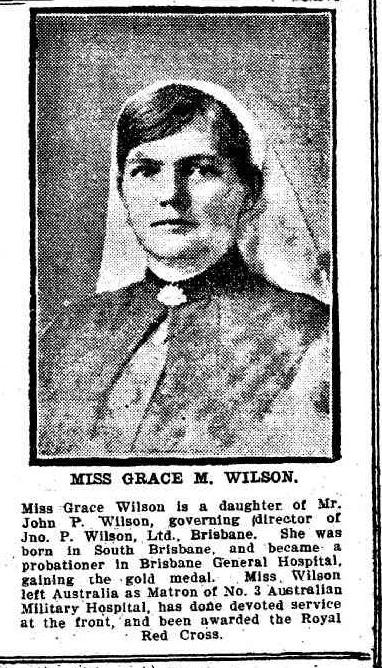The Face of Australian War Nursing
Have you found the option to search for Illustrated Articles in Trove’s digitised newspapers section yet? It’s on the left hand side of the basic search results with the options to refine your search by State, Title, Category or Decade or on the Advanced search page. It is one of my favourite features in Trove.
While searching for further information on Matron Wilson there were a few illustrated articles which covered both World Wars and had photographs. Some examples include ‘MISS GRACE M. WILSON‘ from The World’s News in 1916, WOMAN OF THE MONTH-Army Nurses’ Matron-in-Chief from the West Australian in 1940 and MATRON WILSON HOME FROM WAR from the Courier Mail in 1941. The text is available on Trove to copy and needed only minimal editing, otherwise the articles can be printed or saved as a PDF or JPEG. There are a variety of citations which can be copied for each article or downloaded into Endnote or BibTex. If you have registered for Trove you might simply save them to a new list once you log in.
WOMAN OF THE MONTH.
Army Nurses’ Matron-in-Chief
RETURNED soldiers throughout Australia honour the name of Miss Grace M. Wilson, Matron-in-Chief of the Australian Army Nursing Service and chief matron of the Third Australian General Hospital during the Great War.
Miss Wilson served overseas from early in 1915 until late in 1919 and during this time was mentioned four times in dispatches. For her distinguished work she was awarded the Order of the Commander of the British Empire, the Royal Red Cross and the Florence Nightingale Medal, being one of only two nurses in Australia to hold the last mentioned honour.
At present she is matron of the Alfred Hospital Melbourne, and a member of the Council of the Royal Victorian College of Nursing. Her nursing career since she enrolled at the Brisbane Hospital as a probationer has been a distinguished one. She remained at the Brisbane Hospital for five years after completing her training and then did post-graduate work in London. She then returned to Australia and when war broke out in 1914 she was principal military matron of Queensland. Early in 1915 she was sent overseas with the Third Australian General Hospital, being transhipped from England to Alexandria. She served first at Lemnos under the worst possible conditions, was sent next to Egypt, where the Third Australian General Hospital was housed in old Egyptian army barracks at Abbassia, and, finally, reached Abbeville in France, where she remained until July, 1919, when the Abbeville Hospital closed after having attended to wounded men coming down from clearing stations long after the Armistice.
Since her return from the war Miss Wilson has been attached to the Children’s Hospital in Melbourne, has conducted a private hospital and finally became matron of the Alfred Hospital. In 1937 she led the Australian contingent of returned army nurses to the coronation in London and now, since the outbreak of the present war, has been giving her attention to the preparing of Australia’s army nurses for service overseas. To date 138 nurses have been selected to accompany the second A.I.F., and, in addition, there will be 16 masseurs, and a bacteriologist (Miss Maris Freeman, of the Walter and Eliza Hall Institute of Research, Melbourne). Miss Freeman has been enrolled as a V.A.D. and will wear that uniform.
 MATRON WILSON HOME FROM WAR
MATRON WILSON HOME FROM WAR
Two generations of Diggers in the Middle East have known the kindly and efficient work of Matron Grace Wilson, Matron-in-chief, A.I.F., who arrived home in Brisbane from the battle front yesterday. Regretfully Matron Wilson said she would not be returning to the front; she was invalided home.Quiet and camera-shy, she talked of Palestine, Egypt, and Greece, where she watched young Australian nurses make history with their courageous endurance. Some rested after Greece, she said, but they were all back on duty now. Matron Wilson said that the best possible was being done for the soldiers, with better hospitals than those of the last war, but they sadly lacked books. “Tell the people, please, to send them reading matter—small books, digests, and the like,” she said. In supervising tours of hospitals Matron Wilson saw hundreds of wounded Italian prisoners. They were very grateful, she said. They were treated just like Australians. She described the plan to send V.A.D. volunteers to help staff the A.I.F. hospitals abroad as “a great idea.

